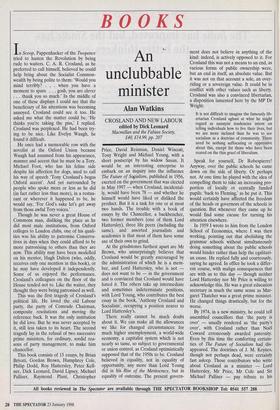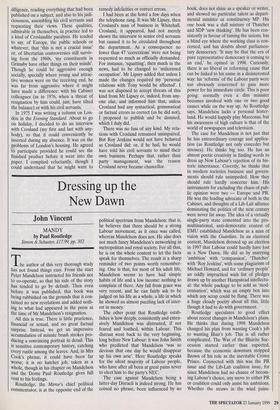BOOKS
unclubb able minister
Alan Watkins
CROSLAND AND NEW LABOUR edited by Dick Leonard Macmillan and the Fabian Society, £14.99, pp. 207 In Scoop, Pappenhacker of the Twopence tried to hasten the Revolution by being rude to waiters. C. A. R. Crosland, as he preferred to call himself, believed he could help bring about the Socialist Common- wealth by being polite to them: 'Would you mind terribly? . . . when you have a moment to spare . . . gosh, you are clever . . . thank you so much.' In the middle of one of these displays I could see that the beneficiary of his attentions was becoming annoyed. Crosland could see it too. He asked me what the matter could be. 'He thinks you're taking the piss,' I replied. Crosland was perplexed. He had been try- ing to be nice. Like Evelyn Waugh, he found it difficult.
He once had a memorable row with the novelist at the Oxford Union because Waugh had assumed from his appearance, manner and accent that he must be a Tory. Michael Foot, who has his feline side despite his affection for dogs, used to call his way of speech 'Tony Crosland's bogus Oxford accent'. And yet surrounded by people who spoke more or less as he did (in fact rather less than more), in a restau- rant or wherever it happened to be, he would say, 'For God's sake let's get away from those awful Tory voices.'
Though he was never a great House of Commons man, disliking the place as he did most male institutions, from Oxford colleges to London clubs, one of his quali- ties was his ability to patronise Conserva- tives in days when they could afford to be more patronising to others than they are now. This ability may have been modelled on his mentor, Hugh Dalton (who, oddly, receives only one mention in this book), or he may have developed it independently. Some of us enjoyed the performance. Crosland's colleagues on the floor of the House tended not to. Like the waiter, they thought they were being patronised as well.
This was the first tragedy of Crosland's political life. He loved the old Labour party, the party of Comrade Chairman, composite resolutions and moving the reference back. It was the only institution he did love. But he was never accepted by it, still less taken to its heart. The second tragedy lay in the refusal of two successive prime ministers, for ordinary, sordid rea- sons of party management, to make him chancellor.
This book consists of 15 essays, by Brian Brivati, Gordon Brown, Humphrey Cole, Philip Dodd, Roy Hattersley, Peter Kell- ner, Dick Leonard, David Lipsey, Michael Palliser, Raymond Plant, Christopher Price, David Reisman, Daniel Wincott, Tony Wright and Michael Young, with a short postscript by his widow Susan. It would be an interesting enterprise to embark on an inquiry into the influence The Future of Swialism, published in 1956, exerted on the government that was elected in May 1997 — when Crosland, incidental- ly, would have been 78 — and whether he himself would have liked or disliked the product. But it is a task for one or at most two hands. The trouble with a book of essays by the Chancellor, a backbencher, two former members (one of them Lord Hattersley), three life peers (including the same), and assorted journalists and academics is that most of them have some axe of their own to grind.
At the grindstones furthest apart are Mr Brown, who unsurprisingly believes that Crosland would be greatly encouraged by the administration of which he is a mem- ber, and Lord Hattersley, who is not does not want to be — in the government and is convinced that Crosland would have hated it. The others take up intermediate and sometimes indeterminate positions, with Lord Young, who contributes the best essay in the book, 'Anthony Crosland and Socialism', occupying a position nearer to Lord Hattersley's.
There really cannot be much doubt about it. We can make all the allowances we like for changed circumstances: for much higher unemployment, a world-wide economy, a capitalist system which is not nearly so tame, so subject to governmental or union control, as Crosland optimistically supposed that of the 1950s to be. Crosland believed in equality, not in equality of opportunity, any more than Lord Young did in his Rise of the Meritocracy, but in equality of outcome. The present govern- ment does not believe in anything of the kind: indeed, is actively opposed to it. For Crosland this was not a means to an end, as various forms of public ownership were, but an end in itself, an absolute value. But it was not on that account a sole, an over- riding or a sovereign value. It could be in conflict with other values such as liberty. Crosland was also a convinced libertarian, a disposition lamented here by the MP Dr Wright: It is not difficult to imagine the famously lib- ertarian Crosland aghast at what he might regard as nannyist tendencies intent on telling individuals how to live their lives, but we are more inclined than he was to see socialism as a doctrine of community. There need be nothing suffocating or oppressive about this, except for those who have been reared on the thin gruel of liberalism.
Speak for yourself, Dr Robespierre! Anyway, over the public schools he came down on the side of liberty. Or perhaps not. At one time he played with the idea of compelling them to take an increasing pro- portion of locally or centrally funded pupils: 'back to Fleming,' as he put it. This would certainly have affected the freedom of the heads or governors of the schools in question. But whenever they came up he would find some excuse for turning his attention elsewhere.
In 1959 I wrote to him from the London School of Economics, where I was then working, pointing out that abolishing the grammar schools without simultaneously doing something about the public schools would hinder rather than help the egalitari- an cause. He replied fully and courteously, saying he agreed. In office he took a differ- ent course, with malign consequences that are with us to this day — though neither Lord Hattersley nor Mr Price is willing to acknowledge this. He was a great education secretary in much the same sense as Mar- garet Thatcher was a great prime minister. He changed things drastically, but for the worse.
By 1974, in a new ministry, he could tell assembled councillors that 'the party is over' — usually rendered as 'the party's over', with Crosland rather than Noel Coward erroneously awarded paternity. Even by this time the comforting certain- ties of The Future of Socialism had dis- appeared. The doctrines of J. M. Keynes, though not perhaps dead, were certainly fast asleep. Those contributors who write about Crosland as a minister — Lord Hattersley, Mr Price, Mr Cole and Sir Michael Palliser — pay . tribute to his diligence, reading everything that had been published on a subject, and also to his judi- ciousness, assembling his civil servants and requesting their views. These qualities, admirable in themselves, in practice led to a kind of Croslandite paralysis. He tended to say, of Europe, the public schools or whatever, that 'this is not a crucial issue' or, of libertarian controversies still surviv- ing from the 1960s, 'my constituents in Grimsby have other things on their minds'. Though he could be aggressive enough socially, specially where young and attrac- tive women were on the receiving end, he was far from aggressive where it might have made a difference: with his Cabinet colleagues (as in 1976, when a threat of resignation by him could, just, have tilted the balance) or with his civil servants.
In 1975 I was writing a column on Lon- don in the Evening Standard. About to go on holiday, I decided to do an interview with Crosland (my first and last with any- body), so that it could conveniently be inserted during my absence. It was on the problems of London's housing. He agreed to participate provided he could see the finished product before it went into the paper. I complied reluctantly, though I could understand that he might want to remedy infelicities or correct errors.
I had been at the hotel a few days when the telephone rang. It was Mr Lipsey, then Crosland's man of business in Whitehall. Crosland, it appeared, had not merely shown the interview to senior civil servants but caused it to be circulated throughout the department. As a consequence no fewer than 47 'corrections' were not being requested so much as officially demanded. For instance, 'squatting', then much in the news, had to be changed to 'unlicensed occupation'. Mr Lipsey added that unless I made the changes required my 'personal relations with Tony would be affected'. I was not disposed to accept threats of this kind from Mr Lipsey or, indeed, from any- one else, and informed him that, unless Crosland had any syntactical, grammatical or factual errors to correct (as he did not), I proposed to publish and be damned, which I duly did.
There was no fuss of any kind. My rela- tions with Crosland remained unimpaired. But Roy Jenkins would not have behaved as Crosland did: or, if he had, he would have told his civil servants to mind their own business. Perhaps that, rather than party management, was the reason Crosland never became chancellor.



























































 Previous page
Previous page